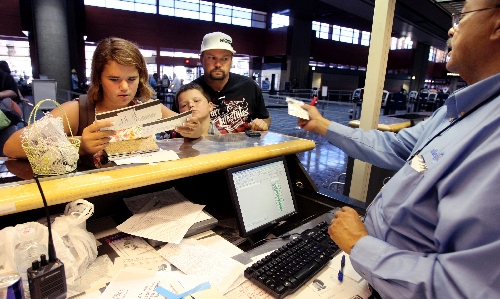Feds delay rules on airline pricing, advertising
The airline industry has received a reprieve on complying with major new federal pricing and advertising rules, but this has not mollified Las Vegas-based Allegiant Travel Co., which stridently objects to the rules.
The U.S. Department of Transportation announced the new policy on April 20, but decided Thursday to delay implementing key pieces until Jan. 24. Almost all of the changes were to kick in on Aug. 23, while the requirement that an advertised fare include all government taxes and fees instead of the longstanding practice of keeping them separate carried an Oct. 24 deadline.
Allegiant and fellow discounter Spirit have both filed lawsuits in Washington, D.C., to halt the rules, bundled under the official name "Enhancing Airline Passenger Protections."
On July 6 they sent the department a joint objection saying, in part, that "The (rule) threatens the carriers' very way of doing business and ultimately will harm the public and communities they serve."
Besides showing taxes and fees in the promoted base fare, which Allegiant worries will deter some of its budget-conscious passengers from flying, some of the provisions it disputes most strongly include making bag fees more prominent with e-tickets; allowing all passengers 24 hours after booking to cancel a purchase; and prohibiting post-purchase price increases. Earlier this year Allegiant considered creating an optional fare that would rise or fall with fuel prices, but did not move ahead with it.
Both carriers adopted strategies of selling almost everything besides the seat as an extra, from charging a "convenience fee" to buy tickets online to selling water during the flight. This has helped hold the base fare lower than many competitors.
The new rules would leave "little distinction between low-fare carriers and legacy carriers. Ultimately, this will hinder the ability of low-cost carriers to survive in the market," the airlines said.
Although he opposes the rules, Robert Herbst, who runs the analysis site airlinefinancials.com, does not foresee catastrophic consequences for the discount airlines.
"There is probably some drama in what they are saying, but that's pretty typical in this type of debate," he said.
Wall Street analysts have scarcely mentioned the rules in research reports and Allegiant's stock has moved little since April. By contrast, it dropped considerably earlier in the year, when Allegiant started to trim its flying schedule due to high fuel prices.
Other airlines requested the delay merely to adjust various computer systems and properly train customer service agents.
Even the American Society of Travel Agents wanted more time implement changes, even though it supports the rules.
"ASTA reaffirms its strong support for the direction the department is taking in forcing airlines to provide stronger protection for consumers who, for the most part, have no realistic alternatives to air transportation," the group wrote in a July 6 letter.
In a July 20 reply to Allegiant and Spirit, Susan Kurland, DOT's assistant secretary for aviation and international affairs, stood by the rules and predicted they would withstand a court challenge.
She noted that violations of current price advertising rules had risen steadily in the past three years.
"With the advent of mobile technology ... there is an even greater likelihood that carriers and ticket agents will find new and creative, and in some cases deceptive, ways to advertise airfares," she wrote.
The new rules also move in several other directions, including more compensation for passengers booted from oversold flights, lengthening the notice before canceling flights, requiring bag fee refunds for lost luggage and requiring international carriers to follow rules on how long loaded planes can be kept on the ground waiting to take off.
Contact reporter Tim O'Reiley at
toreiley@reviewjournal.com or 702-387-5290.

















